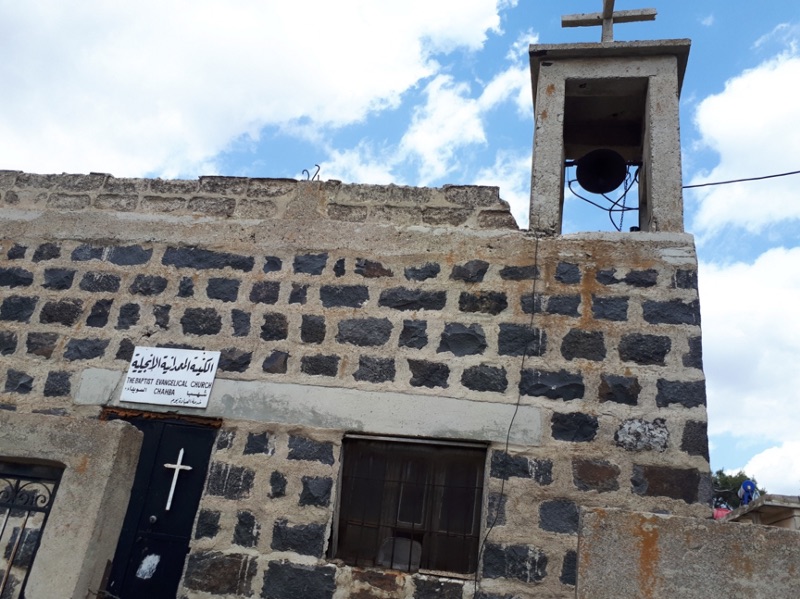The Syrian civil war is among the bloodiest conflicts of the 21st century to date. The UN estimated that 400,000 people had been killed in the ongoing fighting by 2016, the last year the organization tracked casualties in Syria. Millions more are either internally displaced or living abroad as refugees, and the country has suffered massive damage to its infrastructure, including water lines, the electricity grid, schools, and hospitals.
But some areas in Syria have been spared the worst of the war’s violence, even as they suffer secondary effects like economic stagnation and rising crime. This includes the Druze-majority province of al-Suwayda in the south. Al-Suwayda residents are split politically, but ethnic and religious solidarity have kept these divisions from developing into armed conflict.

Traffic Circle in al-Suwayda city. Source: Navanti Group
Navanti researchers visited al-Suwayda this year to learn more about how civilians are faring there.
Religious leaders keep the peace
The majority of al-Suwayda residents are Druze, an esoteric religious group that has roughly one million adherents worldwide. Some locals are loyal to Damascus, others are sympathetic to the Syrian revolution, and a third category are neutral or avoid politics, but all are united in their opposition to allowing the war into their province.
“Here in al-Suwayda, we protect our own land and people. We won’t let anyone enter, except over our dead bodies.” Retiree, al-Suwayda city
Local Druze religious authorities, which have divergent political orientations, exercise considerable influence over the population and share residents’ desire to keep the province free of fighting. The Men of Dignity Movement, a grassroots organization with no official religious designation among the Druze, is one such group. Formerly headed by a fiery cleric named Waheed al-Bal’aus, the Men of Dignity stand against any perceived aggression against the Druze of al-Suwayda, whether from rebel groups operating in nearby Dara’a province, ISIS — which has a presence on the province’s eastern outskirts — or from the Syrian government itself.

Druze Shrine in al-Suwayda city. Source: Navanti Group
Early on in the conflict, the Men of Dignity repeatedly raided government detention centers to free young Druze men who were being held for mandatory military service.
“The religious sheikhs make the decisions in al-Suwayda — without them al-Suwayda means nothing. They’re our leaders, they represent us and prevent the regime from recruiting our Druze young men to fight in combat.” Teacher, al-Suwayda city
Yet the Men of Dignity never allied themselves with rebel groups or took up arms against the government, even after Waheed al-Bal’aus was assassinated in an operation widely believed to be carried out by Syrian security services. Instead, the Men of Dignity continued to focus exclusively on threats to the local Druze community after Waheed al-Bal’aus brother, R’afat, took up the reins of the organization. When Navanti researchers visited al-Suwayda earlier this year, here’s what some residents had to say about R’afat al-Bal’aus:
“Sheikh R’afat al-Bal’aus is responsible for the most prominent local military organization that encouraged residents to keep themselves away from the war that the rest of the country is living through.” Media activist, al-Suwayda city
“Sheikh R’afat al-Bal’aus is a brave man who talks openly about the oppression that Druze face. He defended the province and its people from ISIS, al-Nusra, and the Syrian regime. He’s a disciplined man, very fair, has good judgement, and knows what’s best for the Druze. He’s one of the main reasons the province has remained neutral [in the ongoing conflict].” Mechanic, al-Suwayda city

Druze Shrine in al-Suwayda city. Source: Navanti Group
Sheikh Yusuf Jarbua’ is the head of the province’s chief religious authority, the Men of Reason, which most residents turn to for spiritual guidance on matters large and small. As opposed to the Bal’aus family that heads of Men of Dignity Movement, Sheikh Yusuf Jarbua’ is considered to have loyalist political sympathies, and close relations with the Syrian government. But even some residents who support the Syrian opposition hold Sheikh Jarbua’ in high regard, because of his high position among the Druze and defence of his sect’s interests.
“The Men of Dignity and Men of Reason are the most important people in al-Suwayda. They help to solve problems and disagreements between residents…they have religious, social, and political authority in the province.” Nurse, al-Suwayda city
“I get monthly assistance from the [Druze] Sect House that is led by Sheikh Yusuf Jarbua’. He’s a very good man who helps those in need, and is kind to them…I don’t think anyone refuses what he asks, or dislikes him.” Stay at home mom, al-Suwayda city
R’afat al-Bal’aus and Yusuf Jarbua’, as well as other local religious figures, have prioritized keeping their communities safe over waging internecine political battles. While their efforts, and the support of residents, has kept al-Suwayda insulated from the worst of the war, the province faces a host of problems that threaten to undermine its hard-won stability, to be explored in part two of this series.

Baptist Church in al-Suwayda city. Source: Navanti Group
“The slogan, ‘Religion is for God, the Country is for All’ is the eternal symbol of the residents of al-Suwayda province, who refused to get involved in the Syrian civil war. This slogan emphasizes the humanity of al-Suwayda’s people, and their rejection both of sectarian fighting, and of fighting on behalf of those in power.” Human rights activist, al-Suwayda city

